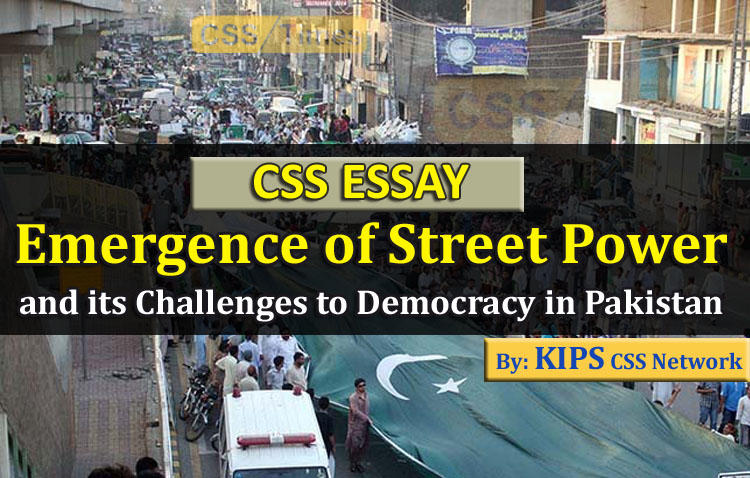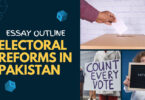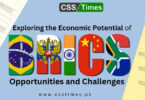Essay Outline
Emergence of Street Power and its Challenges to Democracy in Pakistan
1. Introduction
1.1 Street power derails democracy when government fails to provide equity.
2. Historical emergence of street power
2.1 Martial laws deprived people of their civil rights. i.e. NSF launched in Ayub Khan era.
2.2 Blame game of political parties over their vested interests.
3. Why does street power emerge?
3.1 Protagonists march against government to deter democratic institutions. i.e. dharnas, rallies.
3.2 Street power strains tranquility. i.e. barred roads, mass injuries.
4. Who uses street power?
4.1 Political parties.
a) bringing mass rallies to blame each other for wrongdoings.
b) To overwhelm each other for their interests.
4.2 Religiopolitical parties.
a) To enact Islam-based laws.
b) Blasphemous attacks add fire to the fuel.
4.3 Ethnopolitical parties
a) To show concerns over maximum shares of resources
b) Chanting slogans of disintegration.
5. Street power – a challenge to democracy
5.1 At national level
a) Multi-national politics undermines nation-state.
b) Sabotaging economic developments for their interests. i.e. ANP protests against CPEC.
c) Partisanship hinders justice and democracy
d) Sit-ins outside the democratic institutions. i.e. parliament, Supreme Court.
e) Parties deter democratic institutions through lockdown, dharnas, riots.
5.2 At individual level
a) Growing religious and cultural intolerance jeopardize human rights.
b) Disenchantment with the elected civilian ruling.
c) Middle-class revolt due to stagflation create impasse
d) Victims of tragic incidents question from government of their rights. i.e. Gadani incident, plane crash
e) Parties make inroads into government institutions to recruit young people to their folds.
6. Highlighted case studies in this regards.
a) Role of Indian propaganda through media brings turmoil i.e. Balochistan issue.
b) State-sponsored terrorism threatens civil liberties to dismantle democracy. i.e. RAW, NDS
c) Banned terrorist organizations carry out soft and hard targets. i.e.IS, TTP, LeJ
7. Conclusion
8. Way forward
a) Providing equal opportunities to provinces in all mega projects.
b) Curbing the influence of exiled parties.
c) Proper functioning of democratic institutions.
Read also: CSS Essay | War on Terrorism is Contributing towards Growing Abuse of Human Rights
Complete ESSAY: Emergence of Street Power and its Challenges to Democracy in Pakistan
Street power emerges when people are deprived of their civil rights. This leads to aggression against the ruling government, which results in dismantling democracy. However, street power takes its roots from the eras of martial law administration, since the first National Student Federation (NSF) launched in the late 1960s. Since, then it was prevailed in Pakistan by the subsequent political parties. Some take advantage of its to gain their vested interests while others due to their dissatisfaction from their elected civilian ruling. However, this results into nothing except mass injuries, arsons, barricades and vandalism. Hence, political parties use street power to deter democratic institutions as their partisans not only impede economic development but also jeopardize justice and democracy. Moreover, individuals due to the lack of egalitarianism and foreign factors to undergo their hidden agendas are equally responsible for dismantling democracy in Pakistan.
When political parties flex their muscles, democratic institutions get netted and become quite fragile to perform their operations. As Chief Justice-designate of Pakistan pledged that the judiciary would not bear any pressure and expediency, and that the judges would undergo justice without any fear.
Moreover, partisanships of political parties undergo sit-ins outside the democratic institutions to bring them to their knees. For example, PTI leadership intended to lockdown Islamabad on November 2nd, 2016, Whereas Islamabad High Court (IHC) allowed PTI to hold protests at Democracy Park. It is a government designated place for sit-ins and rallies. Moreover, the Chinese ambassador to Pakistan summoned PTI leadership and urged not to jeopardize the China-Pakistan Economic Corridor (CPEC) project by locking down the capital. Not only political parties have brought challenges to democracy in Pakistan but the individuals as well, owing to the lack of egalitarianism.
Individuals question the government when they are not provided with justice and security. For example, the Gadani incident of the ship-breaking industry look the lives of over twenty-six workers and many others injured, has grieved their families as they were the sole breadwinners. Moreover, this industry is amongst the world’s largest industries and it contributes to about 12 billion rupees in Pakistan’s economy. But this industry does not provide any safety measures to the workers. The protestors underscored the government to give 5 million rupees to the families of each deceased person besides providing security. In such a situation, foreign factors easily intrude the already devastating state of affairs in a country.
Foreign factors that dismantle democracy in Pakistan include exiled members of political parties and the Indian factor. For example, Former Pakistani President Asif Ali Zardari of Pakistan peoples Part (PPP) returned to Pakistan after fifteen months of his self-exile.He has promulgated to put his four demands to be fulfilled by the government and has threatened to protest otherwise. He also demanded to acquit Dr. Asim Hussian, who is facing legal charges due to his involvement in corruption and terrorism cases.
Exiled members of political parties are also involved in the cases of corruption and terrorism. This not only hampers judiciary but also sows the seeds of antagonism in indigenous people in a country. Mr. Zardari himself confessed to have ties with the Karachi-based businessman Anwar Majeed, who is wanted under Anti-Terrorism Act. On the other hand, India is taking advantage of this situation in Pakistan, plaguing the minds of people by bringing unrest. As social media networks have a rising impact on society, this has paved the way for India to easily pollute the minds of Balochis to impede the CPEC project. She launched mobile-based applications to provide radio services to the people of Balochistan. It was intended to let the Balochis know that they are being deprived of their rights in the CPEC project.
Moreover, it engrossed their minds to demand a separate nation state. Mr. Modi used this as his weapon to divert the attention of the international community form the atrocity of the Indian army in Indian occupied Kashmir (IOK). This was a major backlash for Pakistan.
Hence, National integrity and solidarity are pivotal elements for the democratic government of Pakistan. Therefore, political parties need to put aside their grievances over their interest and cease using street power. Their cooperation would let the democratic institutions operate in a free and just manner. Moreover, their solidarity would also lessen the foreign factors to undergo their ulterior motives. This also gives a beacon of hope for Pakistan to flourish in the international community.
A democratic government needs its three pillars-executive, legislature and judiciary to undergo their duties without any fear. A single pillar is unable to bear the weight if the others are fragile.
Therefore, Pakistan needs all of her pillars to be strong in tandem. Moreover, Pakistan needs to rekindle her policies to address the grievances of a common man as democracy ensures the civil liberty. Only then, the street power that has put shackles on democratic institutions can be rooted out.








[…] Read Also: CSS Essay: Emergence of Street Power and its Challenges to Democracy in Pakistan […]